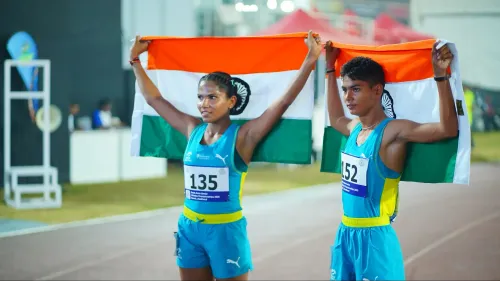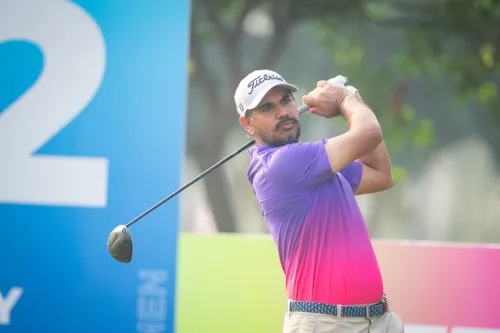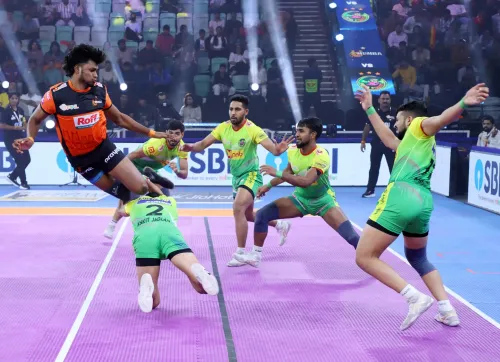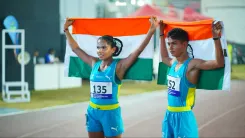Champions Trophy: England Aims for First Title to Overcome Previous Heartbreaks (SWOT Analysis)
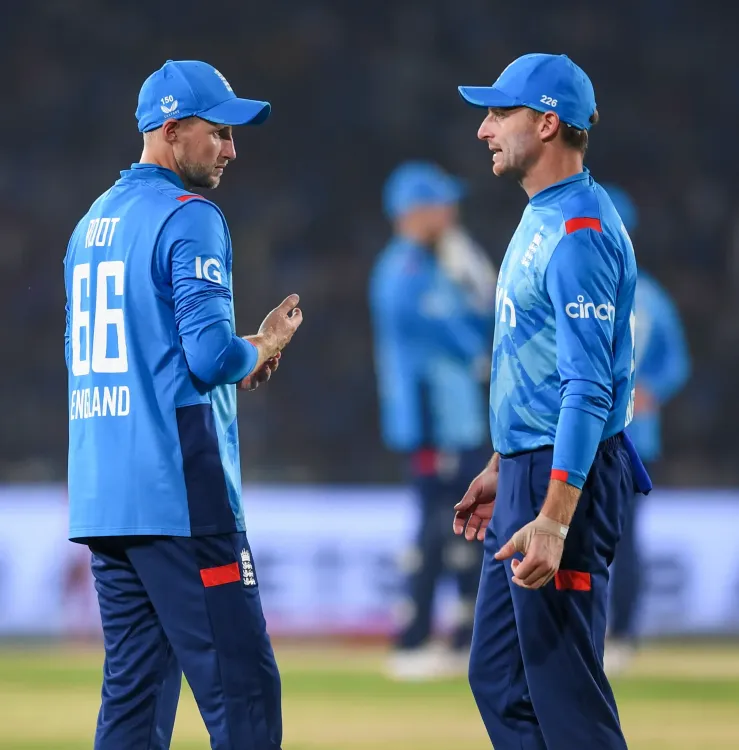
Synopsis
Key Takeaways
- England's strong batting unit is crucial for their success.
- They face challenges due to recent poor performances.
- Injuries and player absences have disrupted team continuity.
- Spin department lacks depth, raising concerns.
- The pace attack possesses significant firepower.
New Delhi, Feb 17 (NationPress) England's pursuit of their first ICC Men’s Champions Trophy title is laden with the memories of previous performances and mounting expectations over the years. Having triumphed in both the ICC Men’s Cricket World Cup and the ICC Men’s T20 World Cup, the Champions Trophy is the only white-ball title that eludes them.
Previously, in both 2004 under Michael Vaughan and in 2013 under Alastair Cook, England faced heart-wrenching defeats at the hands of India, falling just short of victory. As they gear up for the 2025 edition, a fully-equipped squad, a revamped tactical strategy, and the bold philosophy of new white-ball head coach Brendon McCullum provide a renewed chance for redemption.
England's strength resides in their powerful batting lineup, which has established their dominance in white-ball cricket over the last decade. Since the 2023 World Cup, they have emerged as the fastest-scoring ODI team, amassing runs at a rate of 6.02 per over. With the likes of Jos Buttler, Joe Root, Harry Brook, Phil Salt, and Ben Duckett, England is well-equipped to take aggressive measures against any foe.
Root’s adaptability and vast experience render him a pivotal player, especially in conditions where spin is anticipated to play a significant role, like in Pakistan. Together with Buttler’s explosive style and Brook’s fearless batting, England's batting order is designed to dominate while also maintaining the ability to stabilize when necessary.
Nonetheless, England’s preparations for the tournament have not been smooth. They have managed only four victories out of thirteen ODIs played since the 2023 World Cup, suffering four consecutive series losses. This decline has raised doubts regarding their capacity to perform under pressure during a major tournament.
The inconsistency largely stems from an unsettled squad, with key players missing various assignments due to injuries, rest, and franchise cricket commitments. Jos Buttler, their captain, has participated in merely six ODIs since the World Cup, disrupting their continuity and rhythm.
Furthermore, the lack of depth in the spin department is a growing concern. With Moeen Ali retired, the responsibility has shifted entirely to Adil Rashid, who is England's most accomplished ODI spinner. Although Rashid remains a world-class bowler, his age at 36 raises questions about his ability to carry the load throughout the tournament. His performance will be crucial, particularly during the middle overs, where England has often struggled to restrict scoring.
Joe Root and Liam Livingstone are the only other potential spin options for England, but neither offers the same level of control or wicket-taking threat. This shortcoming could be detrimental on subcontinental pitches that generally favor slow bowlers.
On the other hand, the bowling unit boasts incredible firepower in pace. With the return of Jofra Archer and the inclusion of Mark Wood, Gus Atkinson, Brydon Carse, and Saqib Mahmood, England possesses a varied and formidable bowling arsenal. Each pacer brings unique strengths—Archer’s raw pace and precision, Wood’s extreme speed, Atkinson’s skiddy bounce, and Carse’s adaptability as a seam-bowling all-rounder.
If these fast bowlers find their rhythm, they can challenge even the most formidable batting line-ups. However, England's foremost worry remains their bowling economy. Since the 2023 World Cup, they have allowed an average of 6.41 runs per over, the worst among all teams during this timeframe. This weakness was particularly evident in their recent ODI series defeats against India (3-0), where opposing batters exploited England’s lack of control during the middle overs.
The absence of Ben Stokes and Sam Curran complicates matters further. Stokes, often England’s key player in high-stakes situations, has chosen to focus on his Test career, leaving a significant gap in both leadership and middle-order stability. Curran's inconsistent performances with the ball have led to his exclusion. Their absence creates a lack of a left-handed middle-order batter, impacting flexibility against specific match-ups, and a left-arm seamer, which limits variety in their bowling attack. Jamie Overton and Brydon Carse must now step up as seam-bowling all-rounders to compensate for Stokes and Curran's absence.
Despite these hurdles, the Champions Trophy offers England a golden chance to rewrite their narrative. This tournament presents an opportunity to address their spin weaknesses, refine their bowling execution, and adopt McCullum's aggressive style of play.
The "Bazball" philosophy, which revolutionized England's Test cricket, is set to influence their white-ball approach, promoting fearless cricket even under challenging conditions. If implemented effectively, this strategy could destabilize opposing teams and provide England with a crucial advantage during tight matches.
England's pursuit of their first Champions Trophy title is set to begin on February 22, against Australia in Lahore. They will follow this with a match against Afghanistan on February 26 at the same venue, and finally, they will face South Africa in Karachi on March 1.
England squad: Jos Buttler (c), Jofra Archer, Gus Atkinson, Tom Banton, Harry Brook, Brydon Carse, Ben Duckett, Jamie Overton, Jamie Smith, Liam Livingstone, Adil Rashid, Joe Root, Saqib Mahmood, Phil Salt, Mark Wood.

